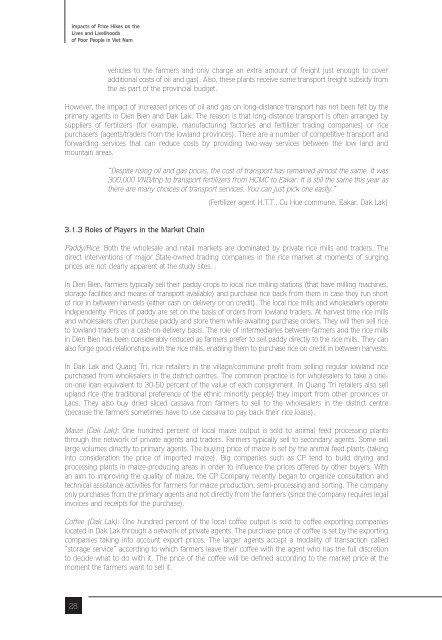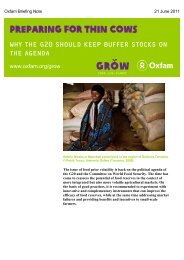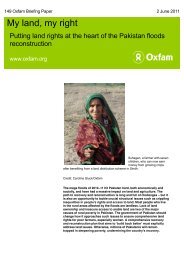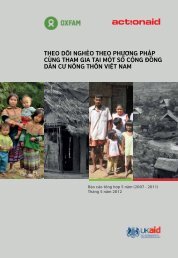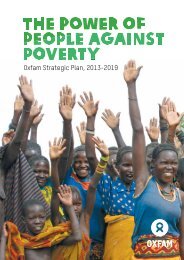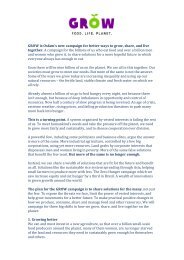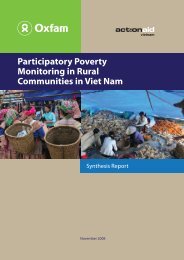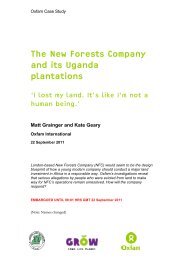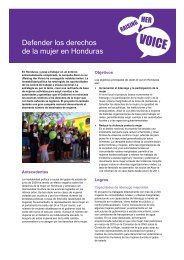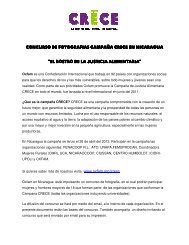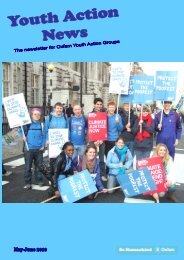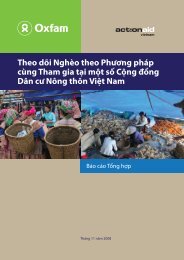Untitled - Oxfam Blogs
Untitled - Oxfam Blogs
Untitled - Oxfam Blogs
Create successful ePaper yourself
Turn your PDF publications into a flip-book with our unique Google optimized e-Paper software.
Impacts of Price Hikes on the<br />
Lives and Livelihoods<br />
of Poor People in Viet Nam<br />
vehicles to the farmers and only charge an extra amount of freight just enough to cover<br />
additional costs of oil and gas). Also, these plants receive some transport freight subsidy from<br />
the as part of the provincial budget.<br />
However, the impact of increased prices of oil and gas on long-distance transport has not been felt by the<br />
primary agents in Dien Bien and Dak Lak. The reason is that long-distance transport is often arranged by<br />
suppliers of fertilizers (for example, manufacturing factories and fertilizer trading companies) or rice<br />
purchasers (agents/traders from the lowland provinces). There are a number of competitive transport and<br />
forwarding services that can reduce costs by providing two-way services between the low land and<br />
mountain areas.<br />
“Despite rising oil and gas prices, the cost of transport has remained almost the same. It was<br />
300,000 VND/trip to transport fertilizers from HCMC to Eakar. It is still the same this year as<br />
there are many choices of transport services. You can just pick one easily.“<br />
(Fertilizer agent H.T.T., Cu Hue commune, Eakar, Dak Lak)<br />
3.1.3 Roles of Players in the Market Chain<br />
Paddy/Rice: Both the wholesale and retail markets are dominated by private rice mills and traders. The<br />
direct interventions of major State-owned trading companies in the rice market at moments of surging<br />
prices are not clearly apparent at the study sites.<br />
In Dien Bien, farmers typically sell their paddy crops to local rice milling stations (that have milling machines,<br />
storage facilities and means of transport available) and purchase rice back from them in case they run short<br />
of rice in between harvests (either cash on delivery or on credit). The local rice mills and wholesalers operate<br />
independently. Prices of paddy are set on the basis of orders from lowland traders. At harvest time rice mills<br />
and wholesalers often purchase paddy and store them while awaiting purchase orders. They will then sell rice<br />
to lowland traders on a cash-on-delivery basis. The role of intermediaries between farmers and the rice mills<br />
in Dien Bien has been considerably reduced as farmers prefer to sell paddy directly to the rice mills. They can<br />
also forge good relationships with the rice mills, enabling them to purchase rice on credit in between harvests.<br />
In Dak Lak and Quang Tri, rice retailers in the village/commune profit from selling regular lowland rice<br />
purchased from wholesalers in the district centres. The common practice is for wholesalers to take a oneon-one<br />
loan equivalent to 30-50 percent of the value of each consignment. In Quang Tri retailers also sell<br />
upland rice (the traditional preference of the ethnic minority people) they import from other provinces or<br />
Laos. They also buy dried sliced cassava from farmers to sell to the wholesalers in the district centre<br />
(because the farmers sometimes have to use cassava to pay back their rice loans).<br />
Maize (Dak Lak): One hundred percent of local maize output is sold to animal feed processing plants<br />
through the network of private agents and traders. Farmers typically sell to secondary agents. Some sell<br />
large volumes directly to primary agents. The buying price of maize is set by the animal feed plants (taking<br />
into consideration the price of imported maize). Big companies such as CP tend to build drying and<br />
processing plants in maize-producing areas in order to influence the prices offered by other buyers. With<br />
an aim to improving the quality of maize, the CP Company recently began to organize consultation and<br />
technical assistance activities for farmers for maize production, semi-processing and sorting. The company<br />
only purchases from the primary agents and not directly from the farmers (since the company requires legal<br />
invoices and receipts for the purchase).<br />
Coffee (Dak Lak): One hundred percent of the local coffee output is sold to coffee exporting companies<br />
located in Dak Lak through a network of private agents. The purchase price of coffee is set by the exporting<br />
companies taking into account export prices. The larger agents accept a modality of transaction called<br />
“storage service” according to which farmers leave their coffee with the agent who has the full discretion<br />
to decide what to do with it. The price of the coffee will be defined according to the market price at the<br />
moment the farmers want to sell it.<br />
28


